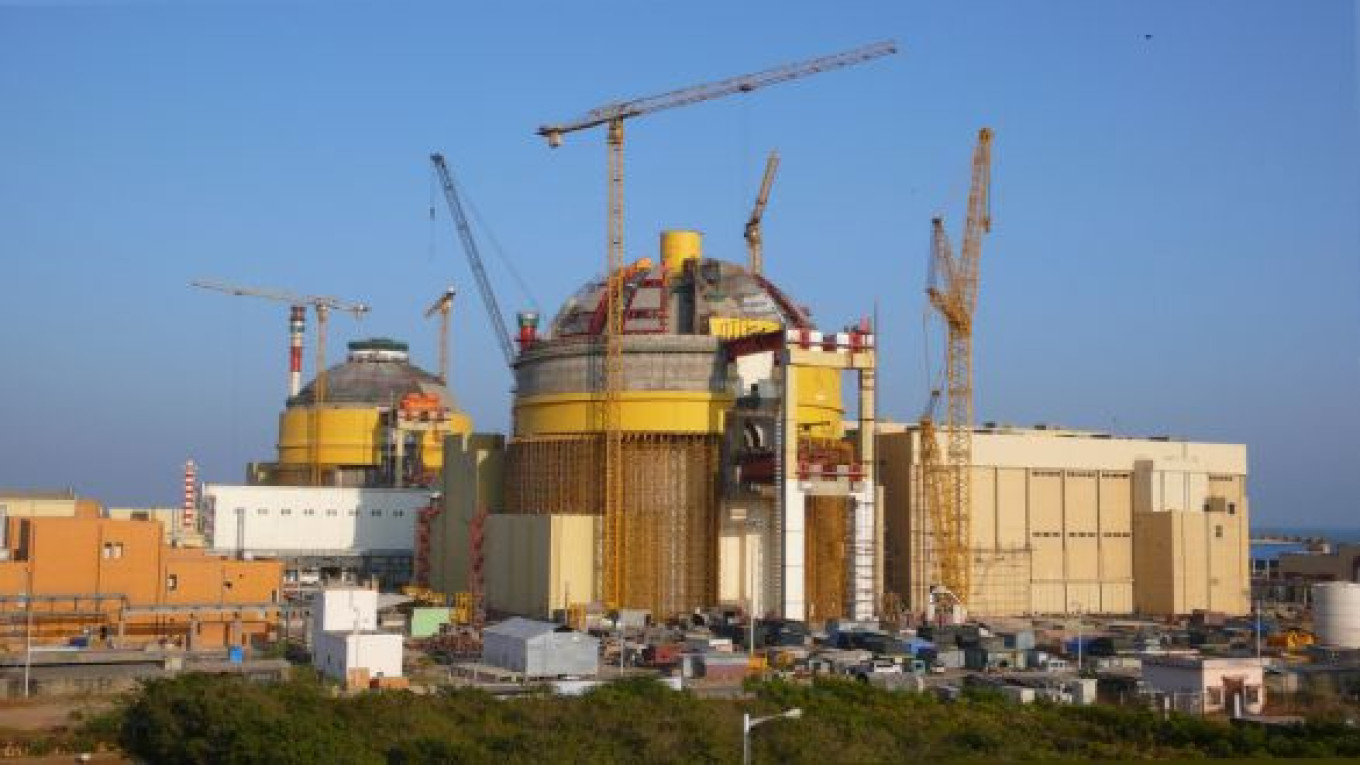NEW DELHI — An Indian NGO has demanded an inquiry into irregularities and improper behavior by Russian suppliers at the multibillion dollar Kudankulam Nuclear Power Plant in the south India state of Tamil Nadu.
Although the plant, which is a project led by Russia’s Rosatom, is finished, it has missed about twenty commissioning deadlines in the past year alone.
A nongovernmental organization that lost the case against the nuclear plant in the Supreme Court last month has now taken the political route to oppose the project. The Tamil Nadu-based People’s Movement Against Nuclear Energy, or PMANE, has urged the principal opposition party, the Bharatiya Janata Party, or BJP, to take up the matter and pressure Prime Minister Manmohan Singh to investigate irregularities in the project.
Although the plant, which is being built by Rosatom, is finished, it has missed about twenty commissioning deadlines in the past year.
PMANE wrote a long letter to the BJP’s leaders on June 6, 2013 and has demanded an inquiry into the construction, equipment, overall quality, performance and viability of the entire Kudankulam nuclear power project and the removal of the fuel rods from the core of the Unit 1 reactor.
The Indian government has responded to similar previous accusations by PMANE in an affidavit it made to the Supreme Court in which it stated that the NGO’s concerns were unfounded and all necessary safety and security mechanisms had been ensured at the Kudankulam, to the extent that the plant is adequately equipped to deal with a terror attack or even a Fukushima-type tsunami.
The NGO has also leveled serious allegations against Russia as well as the Czech Republic and Slovakia.
PMANE has said 10 Czech and Slovak companies have also supplied valves, pumps and cables to the Kudankulam project worth $58 million and alleged that six workers at the plant were killed in electrocution accidents in the past three months. “The quality of the Czech cables and the checkered electrical work, and the role of [plant chief engineer] M. I. Joy in all these [accidents] are important questions that must be looked into,” PMANE said.
The Indian NGO said the Kudankulam project had been constructed with substandard equipment and parts supplied by ZiO-Podolsk, an engineering subsidiary of Rosatom. Over the past few years, ZiO has supplied parts for other nuclear power plants with VVER-1000 reactors, including ones in Taiwan and Iran.
“ZiO-Podolsk began shipping shoddy equipment in 2007 or perhaps even earlier. In February 2012, the procurement director, Sergei Shutov, was arrested for buying low quality and cheap raw material, passing it off as more expensive grade and pocketing the difference. The Federal Security Service has been investigating the case that has serious implications for the safety of nuclear power plants built by Russia,” said the PMANE letter, signed by its Coordinator SP Udaykumar and seven others.
PMANE has also accused the Nuclear Power Corporation India Limited, or NPCIL, of hiding information from the Indian public and misleading the entire nation, possibly to protect some Russian and Indian middlemen and profiteers.
In another accusation, the NGO said a Russian court had convicted Alexander Murach, director of the company Informtech, for fraud and sentenced him to three years in prison for selling counterfeit measuring equipment for nuclear and hydropower plants’ turbines. The NPCIL confirmed in a letter dated May 24, 2013 that they received “communication equipment” from Informtech.
“The Russian and the Indian nuclear authorities are hiding their corruption, wastefulness and inefficiency by conveniently blaming the struggling people for all the delay and cost overrun,” PMANE said.
“The nuclear authorities are hiding the plain truth that Unit 1 is a complete failure, and hence they are trying to revive it with the parts of Unit 2. Nobody knows the total loss that India has suffered because of all these shifting and shuffling,” PMANE said.
The people’s pressure group lambasted the Singh government for its failure to get any firm commitment from the Russians on the newly implemented Nuclear Liability Act with regard to first and second units of the Kudankulam plant.
“The Government of India is not even willing to share the secretive intergovernmental agreement that they signed with the Russian government in 2008. Even as we are dealing with KNPP 1 and 2, the government of India is announcing the agreement on KNPP 3 and 4 with utter disregard for the sentiments of the local people and the people of Tamil Nadu as a whole,” PMANE said.
Contact the author at bizreporter@imedia.ru
A Message from The Moscow Times:
Dear readers,
We are facing unprecedented challenges. Russia's Prosecutor General's Office has designated The Moscow Times as an "undesirable" organization, criminalizing our work and putting our staff at risk of prosecution. This follows our earlier unjust labeling as a "foreign agent."
These actions are direct attempts to silence independent journalism in Russia. The authorities claim our work "discredits the decisions of the Russian leadership." We see things differently: we strive to provide accurate, unbiased reporting on Russia.
We, the journalists of The Moscow Times, refuse to be silenced. But to continue our work, we need your help.
Your support, no matter how small, makes a world of difference. If you can, please support us monthly starting from just $2. It's quick to set up, and every contribution makes a significant impact.
By supporting The Moscow Times, you're defending open, independent journalism in the face of repression. Thank you for standing with us.
Remind me later.


